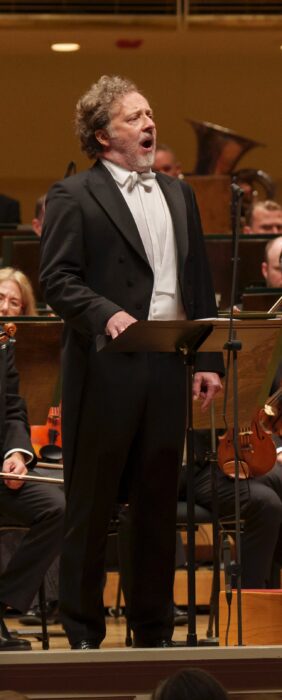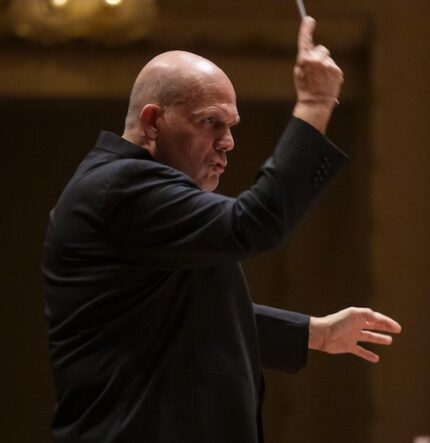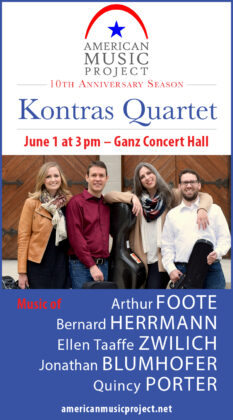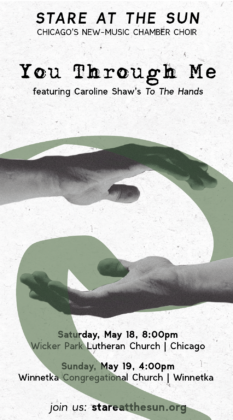Somber Mahler songs, fiery Beethoven make for a timely CSO program

Fresh from launching a Steve Reich premiere last week in his final season as music director of the New York Philharmonic, Jaap van Zweden returned to town to lead a finely balanced program with the Chicago Symphony Orchestra Thursday night.
It’s not often one gets to experience Mahler songs performed at Orchestra Hall—or lieder performed anywhere in Chicago for that matter. But Thursday night, Christian Gerhaher offered a set from Mahler’s Des Knaben Wunderhorn in his first CSO stand in 15 years.
The Wunderhorn collection is not an integral cycle but two separate volumes comprising 21 songs, half of which Mahler orchestrated. Thus, soloists must build their own Wunderhorn Mahler burger, choosing the settings and order.
Gerhaher is a lieder scholar as much as a performing artist. The German baritone’s selection of five Wunderhorn songs was not only well chosen and arranged but made a convincing and cohesive narrative.
Apart from the opening “Rheinlegendchen” (Rhine Legend), which was given apt relaxed playfulness by Gerhaher, the songs were predominantly somber. The middle three settings concentrated on war and its damaged soldier victims, giving this Mahler performance a timely resonance.
Solo voices have suffered in this venue since the 1997 renovation. At times one wanted greater presence and more varied coloring from the singer, with phrase endings sometimes fading away.
Yet Gerhaher remains an innate Mahler stylist and brought an intimacy and confessional sensibility to these shadowy settings. Gerhaher ratcheted up the emotional engagement, from the ghostly premonition of “Wo die schönen Trompeten blasen” (Where the Fair Trumpets Sound) to the fevered psyche of a fatally wounded soldier in “Revelge” (Reveille) with its stark, ironic-hearty “trallali” refrain. “Der Tamboursg’sell” tells of the the title drummer boy who meditates on his impending execution, and received an especially intense rendering by the soloist.
In this context, “Urlicht” (Primeval Light) made an apt finale. More familiar from its later incorporation by Mahler into his Second Symphony (“Resurrection”), the opening stanzas could hardly better reflect the current fraught international situation (“Man lies in greatest need/Man lies in greatest pain”). The existential despair segues into a prayerful desire for illumination to eternal life, and Gerhaher gave this plea for peaceful solace a rapt sincerity that was moving and of the moment.
Van Zweden is an insightful Mahlerian and led a memorable performance of the composer’s Symphony No. 6 with CSO last year. He supported the soloist superbly, keeping the volume down while forcefully putting across Mahler’s bone-rattling colors and sardonic militarisms, a couple brass fluffs apart.

The conductor often brings new music to his programs and did so again leading off the evening with Lumina by Nina Shekhar.
This 11-minute work by the young Indian-American composer was in part inspired by Hindustani ragas. At first hearing that influence seemed less apparent than Shekhar’s piquant scoring and iridescent coloring.
After an unpromising opening suggestive of atonal meandering of the 1960s, the score gradually gains its footing. Lumina suggests a kind of restless, searching pastorale, with swooping glissandi for solo violin (and later, viola). The seesawing tension between darkness and light was manifest with the music rising to an old-fashioned resplendent climax before descending to the elliptical unease of the opening. Shekhar shows skill and confidence in writing for large forces and one looks forward to hearing more from this composer.
The box-office bait came after intermission with Beethoven’s Fifth Symphony.
As jaded as veteran concertgoers can become with repertoire cornerstones, the familiarity of Op. 67 shouldn’t negate the symphony’s greatness nor its regular appearance on programs. As the maxim goes, there is always someone in the hall hearing this music for the first time —live, anyway.
One can hardly imagine a better first experience for newbie listeners than the fiery, surging performance led by van Zweden Thursday night. The applause for his entrance had barely subsided when the Dutch conductor lunged forward with a loud podium stomp to launch the opening bars. Van Zweden led a typically taut and acutely focused first movement—fast and urgent without feeling rushed. Even a clangorous retro cell phone ring didn’t detract from the momentum and drama.
Fleet tempos predominated throughout yet van Zweden found space for a compensating warmth of expression in the Andante. His high-beam style lacked mystery in the transition to the finale, yet the exhilarating account provided both fizzing excitement and a degree of catharsis in the blazing triumph of the final chords.
It was difficult Thursday night not to become mesmerized by the intensity of the double basses in the latter two movements. With three new members this season, the entire section seemed to be playing with a fresh degree of youthful vitality.
The program will be repeated 1:30 p.m. Friday, 7:30 p.m. Saturday and 3 p.m. Sunday. cso.org
Posted in Uncategorized



